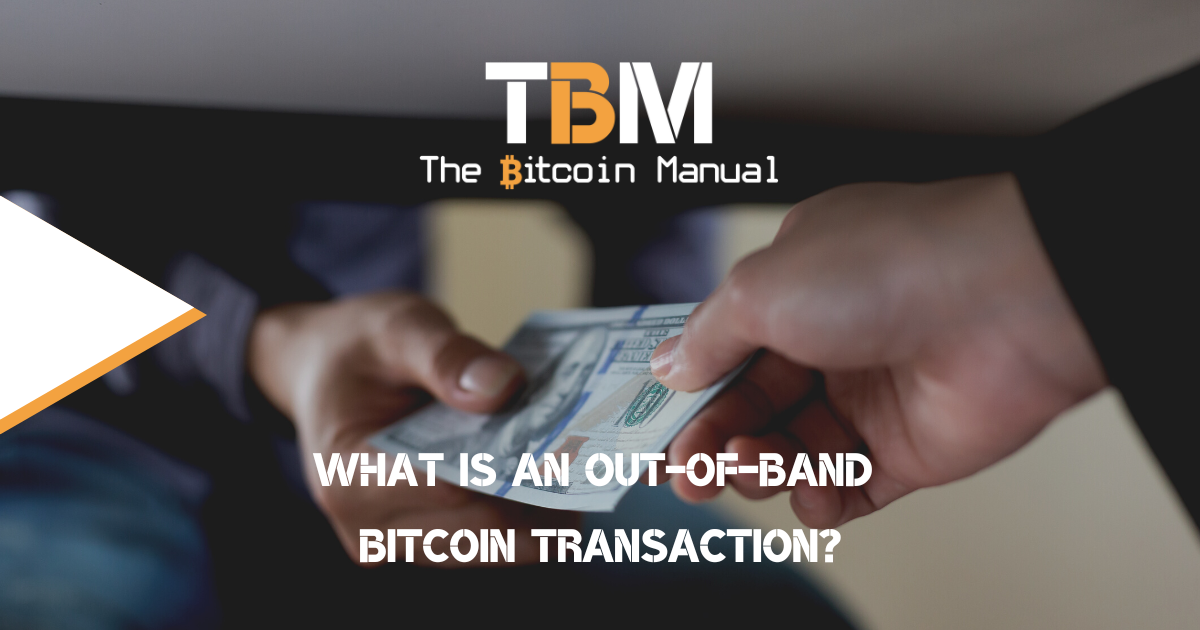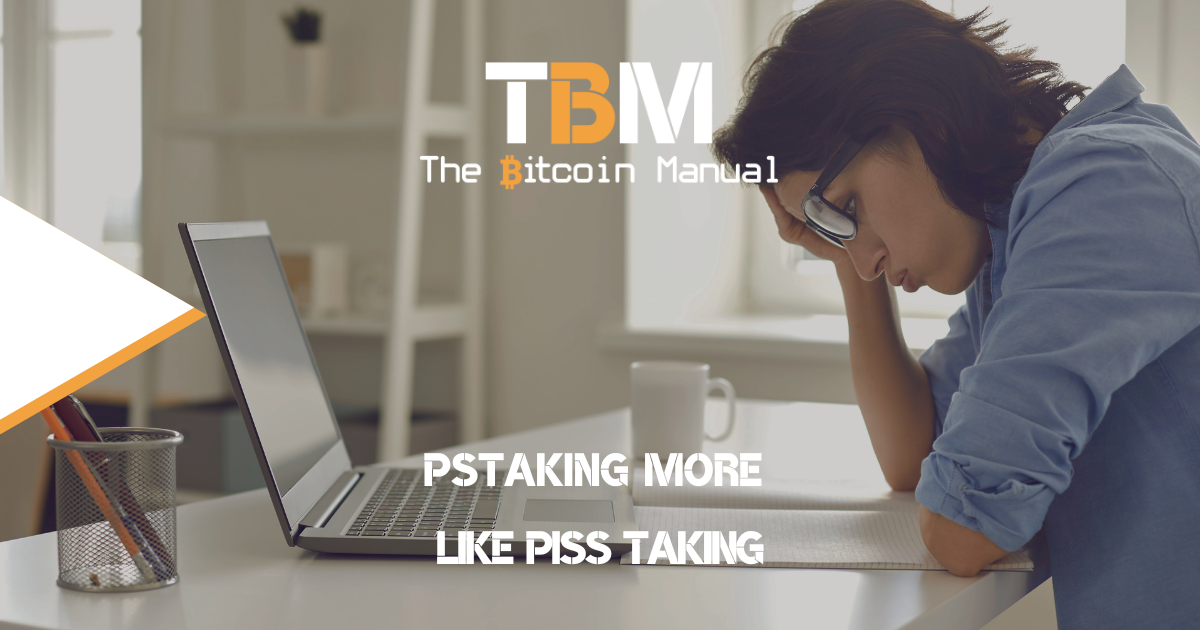Creating a transaction on the bitcoin network is the process of transferring ownership of a UTXO representing a certain amount of satoshis. You first compile a transaction with all the necessary details using the wallet software of your choice, then you broadcast that compiled script via your node or a third-party node, and miners will later pick it up and add it to the next block. This process is repeated over and over roughly every 10 minutes, moving millions worth of bitcoin each day.
If you’ve ever sent or received a bitcoin transaction, you’ve officially been a part of that process.
When a bitcoin transaction is compiled on-chain, there is no intermediary for the transaction; nobody has to be asked for permission, and your transaction is added to the blockchain by you providing an incentive in the fee you’re willing to pay a miner.
All bitcoin transactions require a fee to be paid to miners; a transaction which includes a mining fee in the transaction itself is in-band (i.e., the fee is in the same channel as the transaction). If a fee is paid separately, aside from the transaction, it’s known as an out-of-band transaction.
What is an out-of-brand payment?
Out-of-band payments are deals concluded with miners where fees are paid (usually upfront) for processing transactions in future block space. These out-of-band payments are sent to miners outside of the bitcoin network’s typical process for collecting transaction fees into new blocks. Deals are conducted between parties, and they can agree on a fee outside what the market is pricing a transaction.
The existence of out-of-band payments infers that the bitcoin transaction fee market serves as only an estimate of actual demand for block space. When you and I perform bitcoin transactions, we compete with everyone who wishes to have block space in the next block, and based on the demand and amount of transactions, a fee is determined. You can either replace your fee and bump it up to get ahead in the queue or wait your turn when block space is free or less competitive.
In an out-of-brand transaction, the miner knows which transaction they need to flag and add to a block, and it will usually have 0 or a very low fee on-chain because the transaction fees were paid separately, in a sort of backdoor deal.
These payments can be sent via legacy payment rails, such as bitcoin on a side-chain, through fiat bank accounts and wire transfers, or other altcoin chains using that chain’s native currency or a stablecoin on that chain.
Out-of-band payment schemes are often created on contractual terms, meaning customers and miners receive flat rates regardless of bitcoin fee market volatility. However, some relay networks construct fees that loosely track the on-chain fee market and might be agreed on a discount or premium to market fees based on the type of transaction that needs to be processed.
Looks like @LuxorTechTeam may have executed the first out-of-band ordinal transaction? Hope the miners got paid for that one.https://t.co/8Zvc9hkgnb
— Arceris⚡️⛓ 丰 (@Arceris_btc) February 1, 2023
Why would you conduct an out-of-band transaction?
If the bitcoin network already has a process for managing payment for transactions, why would people need to set up deals directly with miners to get their transactions processed? There are a couple of possible scenarios where this could be an option.
Censored transactions
In certain cases, UTXO sets could be flagged by authorities and seen as tainted bitcoin, which public miners would not wish to touch due to the political pressure around processing these transactions.
Those users looking to move funds can either continue to set a higher fee on-chain until a miner picks it up or approach a miner directly and pay them to process these transactions, or assist in performing CoinJoins to help break chain analysis on bitcoin.
Sponsored transactions
If transactions in a certain part of the world are desperately needed, you often see bitcoin trade at a premium, and due to the urgency of these transactions, people are willing to bid up block space to get these transactions pushed through.
Organisations and charities looking to help these affected parties could approach a miner or mining pool and pay them upfront to give the affected persons priority in blocks or to allow them to pay no fees when securing their transaction on-chain.
Bulk buying and fee hedging
If the internal auction for block space has been particularly volatile over a specific time period and a business that makes regular bitcoin payments sees this affecting their business operations. They could reduce their exposure to this volatility by agreeing on deals with miners and mining pools.
Instead of having to deal with variable costs that impact their margin, the business could agree on a fixed cost over a specific time period and amount of transactions and know that fees will not be an issue for them during that time.
Settling with off-chain funds
Today we have several methods of moving bitcoin that do not include the traditional on-chain transaction; funds can be moved on layer two networks like the Lightning Network or Liquid Network. To use these networks, one would need to lock bitcoin for it to be unlocked on layer two. Sometimes, it might not make sense to unlock funds back to the base chain and instead use layer two to settle.
A user could agree with a miner to group certain transactions into a block and confirm it and then settle the transaction fees using one of the other layer two protocols instead, which offers a cheaper and faster settlement.
Fiat liquidity and selling pressure
Perhaps a bitcoin miner is in need of fiat to pay for certain operating expenses and does not wish to sell their bitcoin into a market that is selling off. Instead of trying to compete with other traders exhausting the current buy walls, miners could instead strike up deals to be paid directly in fiat. They would still get their block subsidy payment in bitcoin as per the network consensus, but the transaction fees for those blocks would be settled in a fiat amount on fiat rails.
The bitcoin miner could then use that fiat to pay for operating costs and wait for a better time to dip into their bitcoin treasury to secure additional fiat.
Risks of out-of-brand transactions
When you bid for block space using the traditional method of processing a transaction, you are in control of what you pay, you can set the fee based on your time preference, and fees are only taken from you when your transaction has been completed. Out-of-brand transactions don’t have that level of security.
Should you have agreed to terms and paid upfront, and the miner either reneges on the deal or goes belly up before completing the transactions, you’re stuck. You would either need to suck it up and pay the current fee on-chain or try to strike up a deal with a new miner or mining pool.
Out-of-band transactions can also be used as a narrative to get naive bitcoin users to hand over funds for services that would never be rendered. Any scammer could tell you they’re a miner and could offer you better fees in the future if you pay them a fee right now. If you’re not directly communicating with public miners or mining pools that can be held accountable, you could be leaving yourself open to getting scammed.
Instead of taking all this unnecessary risk, pay the damn on-chain fee and stop trying to be too clever for bitcoin.
Are you investing in the bitcoin ecosystem?
Do you invest in bitcoin mining? Are you considering bitcoin mining? Have you been mining for some time? What breakdowns have you had, and how did you deal with them?
Let us know in the comments down below.




